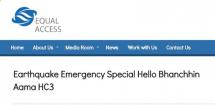Earthquake Emergency Special Hello Bhanchhin Aama Radio Program
Suaahara was a five year (2011-2016) project funded by USAID aimed to improve the nutritional status of women and children in 41 districts of Nepal. Suaahara developed and implemented the integrated Bhanchhin Aama (“Mother knows best”) cohesive platform which involved multiple sectors (Nutrition, Agriculture, WASH, Health Service Promotion, Family Planning), linked Suaahara partners, government and others, and had multiple messages for every target audience (pregnant women, husbands, newly married women, mothers-in-law, etc.).
Before the Nepal earthquake in 2015, community members had been in the habit of calling Bhanchhin Aama radio with their questions; nationally there were about 2,500 calls per week. Within two weeks of the earthquake, a 24 episode Bhanchhin Aama Special program short show was on the air twice in a week for 15 minutes each. Hosted by Aama (mother character), the show answered the community’s questions. This Bhanchhin Aama platform was used to disseminate the messages from the FM stations of earthquake-affected Suaahara districts.
The questions were prioritized and answered by the experts to be aired on the radio stations, and were also sent through email to program staff to share with community members who might not be able to hear radio broadcasts.
The episodes covered the following topics:
- Importance of drinking clean water during calamity (methods of preparation)
- Reproductive health
- Psychological counselling
- Hygienic and safe feeding
- Menstruation hygiene
- Toilet, waste and feces management
- Typhoid and Jaundice
- Family Planning (reproductive health)
- How to keep children safe from various epidemics and taking care of a suffering child
- Psychological fear
- Caring for newborns and mothers
- Child Health
- How to prevent and treat skin diseases?
- How to prevent diseases like typhoid, dysentery and diarrhoea which can be transmitted through water, especially during the monsoon
- Breastfeeding
- Post-earthquake Health
Source: Johns Hopkins Bloomberg School of Public Health/ Center for Communication Programs
Date of Publication: March 25, 2019
SIMILIAR RESOURCES
Tools
Examples
- Suaahara Training Guidelines and Participant Handbooks
- GESI Toolkit
- Suaahara Health Facility Operation and Management Committee Capacity Building Training and Operation Guidelines
- Maternal Newborn Child Health - Nutrition Quality Improvement Tools
- Promoting Quality Malaria Medicine through Social and Behavior Change Communication
- Community Communication MNCH e-Manual: Participatory Health Promotion Sessions
- The Infection Control Symbol Package
- SBCC for Malaria in Pregnancy: Strategy Development Guidance
- The Future of Malaria Social and Behavior Change Communication

